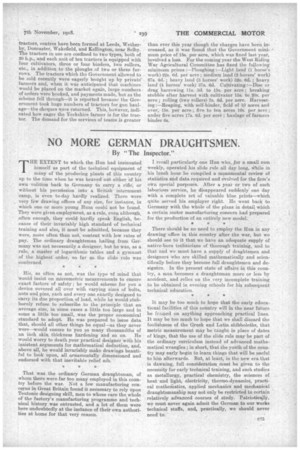NO MORE GERMAN DRAUGHTSMEN.
Page 19

If you've noticed an error in this article please click here to report it so we can fix it.
'
NO MORE GERMAN DRAUGHTSMEN.
' By "The Inspector."
THE EXTENT to which the Hun had insinuated himself as part of the technical equipment of many of the producing plants of this country up to the time when he was heaved out either Of his own 'volition back to Germany to carry a rifle, or without his permission into a British internment camp, is even to-day hardly realized. There were very few drawing offices of any size, for instance, in which one or more young Huns could not be found. They were given employment, as a rule, even although, often enough, they could hardly speak English, because of their invariably high standard of technical training and also, it must be admitted, because they were, more often than not, content with low rates of pay. The ordinary draughtsman hailing from Germany was not necessarily .a designer, but he was, as a rule, a master of logarithmic tables and a gymnast of the highest order, so far * the slide rule was coinYerned.
• His, as often as not, was the type bf mind that would insist on micrometric measurements to ensure exact factors of safety ; he would scheme for you a device covered all over with varying sizes of bolts, nuts and pins, each and every one exactly designed to carry its due proportion of load, while he would stubbornly refuse to subscribe to the principle that an average size, in some cases a little too large and in some a little too small, was the proper economical standard to adopt. He was prepared to issue data that, should all other things be equal—as they never were—would ensure to you so many thousandths of an inch skin, thickness hardening and so on. He would worry to death your practical designer with his insistent arguments for mathematical deduction, and, above all, he would invariably make drawings beautiful to look upon, all ornamentally dimensioned and endorsed with that inevitable relief nib.
That was the ordinary German draughtsman, of whom there were far too many employed in this country before the war. Not a few manufacturing concerns in Great Britain found it necessary to rely upon Teutonic designing skill, men to whose care the whole of the factory's manufacturing programme and technical history was entrusted, and a lot of them were here undoubtedly at the instance of their own authorities at home for that very reason. I recall particularly one Hun who, jor a small sum weekly, operated his slide rule all day long, While in his lunch hour he compiled a monumental review of statistics and data required and evolved for the firm's own special purposes. After a year or two of such. laborious service, he disappeared suddenly' one day with a complete set of valuable blue prints—which quite .served his employer right. He went back to Germany with the whole of the plans in detail which a certain motor manufacturing concern had prepared for the production of an entirely new model.
There should be no need to employ the Hun in any drawing office in this country after the war, but we should see to it that we have an adequate supply of native-born technicians of thorough training, and to that end we must have a supply of draghtsmen and designers who are skilled mathematically and scientifically before they become full draughtsmen and designers. In the present state of affairs in this country, a man 'becomes a draughtsman more or less by accident, and relies on the very, incomplete training to be obtained in evening schools for his subsequent technical education.
It may be too much to hope that the early educational facilities of this country will in the near future be framed on anything approaching practical lines. It may be too much to hope that we shall discard the foolishness of the Greek and Latin shibboleths, that metric measurement may be taught in place of dates of kings, that the use of the slide rule may be part of the ordinary curriculum instead of advanced mathematical wrangles ; in short, that the youth of the country may early begin to learn things that will be useful to him afterwards. But, at least, in the new era that is dawning, full consideration, must be given to the necessity for early technical training, and such studies as metallurgy, practical chemistry, the sciences of heat and light, electricity, thermo-dynamics, practical mathethatics, applied mechanics and mechanical draughtsmanship may not only be restricted to certain relatively advanced courses of study. Patriotically, we must never again admit the German to our works technical staffs, and, practically, we should never need to.






















